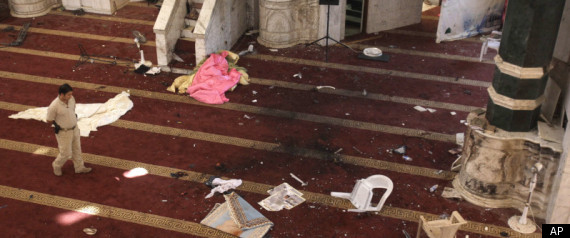Baghdad Mosque Suicide Bomber Disguised Self As Beggar

Baghdad Mosque Suicide Bomber Disguised Self As Beggar

BAGHDAD -- The suicide bomber who killed 29 people at Baghdad's largest Sunni mosque disguised himself as an injured beggar and attended prayers there for nearly a week, a senior religious figure said Monday.
The attack hit Sunnis praying at a special service Sunday night during the holy Muslim month of Ramadan and appeared calculated to try to re-ignite widespread violence in Iraq just months before U.S. troops are to complete their withdrawal.
The bomber, who pretended to be a beggar, had attended prayers for six straight days at the Um al-Qura mosque in western Baghdad, said Sheik Ahmed Abdul Gafur al-Samarraie, head of an endowment that oversees all Sunni religious sites nationwide.
He said the bomber had a bandaged hand and appeared to pose no threat.
"When his face became familiar to the guards they didn't search him last night," al-Samarraie told reporters at the mosque, where blood still stained the marble floors and stairs.
He said guards first became suspicious when they saw the man moving through the crowd trying to get close to al-Samarraie and took him outside. But the man returned through a back door and blew himself up when he was a few steps away from al-Samarraie.
Under deposed dictator Saddam Hussein, a Sunni, Iraq's Shiite majority was persecuted and repressed. Shiites took power after his ouster, stoking Sunni resentment. A 2006 attack on a Shiite shrine in the Sunni city of Samarra escalated widespread sectarian violence in Iraq and nearly ignited a nationwide civil war.
No group immediately claimed responsibility for Sunday's bombing, but suicide attacks generally are a hallmark of al-Qaida, which is dominated by Sunnis. Intelligence officials have speculated that al-Qaida will do almost anything to spark new sectarian violence, but the group recently had focused on attacking Iraqi security forces and the government to punish their alliance with Americans.
With attacks like the mosque bombing, they also aim to show how unstable Iraq remains as U.S. forces prepare to leave by Dec. 31. Iraqi political leaders are weighing whether to ask some U.S. troops to stay beyond the withdrawal deadline.
Al-Samarraie said he was confident the attack would not rupture the already uneasy peace across Iraq or stoke further violence in the way the 2006 Samarra bombing did.
"We will not turn back or retreat," he said, adding the best retaliation was "solidarity and unity."
Two security officials and medics at two hospitals put the casualty toll at 29, with 38 wounded. All spoke on condition of anonymity because they were not authorized to release the information. Al-Samarraie said only six people died and 12 were wounded. Conflicting death tolls are common immediately after large-scale attacks in Iraq.
On Baghdad's streets, weeping relatives and friends held funeral processions for the slain worshippers, including one for a father and his 5-year-old son. Wrapped with blankets, victims' caskets were carried on minibuses while women wailed and beat their chests.
Baghdad Mosque Suicide Bomber Disguised Self As Beggar

